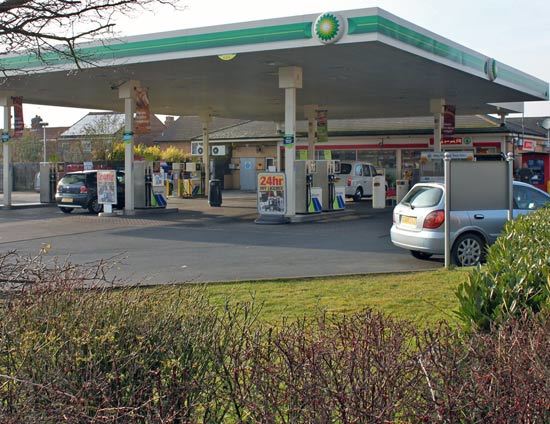Readers question “If a firm does not have access to the supply of a good then the market will not be contestable. E.g. Oil firms could restrict the supply of petrol to petrol stations, making it difficult for new firms to enter. E.g. for airlines a big issue is whether you can get a landing slot at a big airport.” Could you please explain?

A contestable market has freedom of entry and exit, and low sunk costs.
In economics, vertical integration refers to a firm gaining control over different stages of a supply chain.
For example in the petrol industry, we could simplify the industry to four different stages of production
- Oil drilling. – When firms build an oil well and pump out raw crude oil.
- Oil refining – the process where the crude oil is refined into petrol / diesel.
- Transport – where the petrol is transported to retail markets.
- Retail – Where petrol stations sell petrol / diesel to customers at the different petrol stations, such as Esso, Shell, BP, Tesco, Asda, and independent petrol retailers.
Suppose, you want to set up a petrol station to sell petrol in your local town. The costs of buying a premise to sell petrol is relatively low. The big difficulty will be buying petrol from the large oil companies who produce and refine petrol. There are very significant economies of scale in drilling and refining oil so that market is not very contestable. It is dominated by a small number of large firms.
The big oil companies, like Shell, BP, Esso may decide to collude and sell petrol to independent retailers at a very high price making it unprofitable for independent retailers to sell petrol in a petrol station.
Therefore, this is a barrier to entry for a new firm setting up a petrol station. The lack of vertical integration, the difficulty in getting access to relatively cheap petrol.
Unsurprisingly, many small independent petrol stations have been squeezed out of the market because they can’t remain profitable on the small margins between buying petrol and selling it to customers.
Big oil companies like Shell say there is a very small profit margin on selling petrol. That might be true, but their main profit margin comes on the mark up between producing oil and selling petrol to the petrol stations.
Vertical barriers to entry in the airline industry
If you want to set up an airline company, you may be able to rent some planes and employ pilots and air stewards. This makes the sunk costs relatively low. Therefore, in theory, this market should be reasonably contestable. However, a barrier to entry may be gaining access to landing slots at major airports.
If you wanted to set up an airline company flying from London Heathrow to JFK, I’m pretty certain you wouldn’t be able to fly from Heathrow. All the landing slots are taken, there is no space at Heathrow for new companies. Therefore, this is a kind of vertical barrier to entry, you can’t have access to the infrastructure (airport) necessary for entering the market.
Low cost airlines have tended to fly from less popular airports, like Stanstead and Luton, there are more landing slots available here.
Related

Hey,
This a great explanation. And thank so much for that!.
It is stimulating. I am already thinking of creating a small airline company!
Jeneba.